Thailand: JRS responds to the influx of people fleeing violence in Burma
11 November 2010|Oliver White

Bangkok, 11 November 2010 – An estimated 20,000 people have fled to Thailand since conflict broke out between government forces and the fifth brigade of the ethnic Karen rebel group, the DKBA. Fighting began on Monday morning 8 November in the southeastern border town of Myawaddy, less than a day after election polls opened in the military controlled region.
Within hours the UN refugee agency (UNHCR) reported 1,000 refugees crossing the border into Thailand. By the end of the day, the number had risen to 12,000.
Speaking to JRS staff, some refugees said they had fled because they felt the area was not safe, others reported directly witnessing violence between DKBA rebels and government forces.
The Thai authorities and NGOs, including JRS, responded almost immediately to the unfolding crisis. Within hours, medical tents, temporary shelters and food distribution sites were established for the arrivals. A mobile clinic was also set up and the wounded were transported immediately to the nearby Mae Sot hospital.
The next day, temporary latrines were erected and emergency food, sanitary items and medicines were distributed. JRS, and other agencies, then began conducting needs assessments, focusing on protection issues, said Jennifer Titmuss, JRS Thailand’s Urban Refugee Programme Director in the border city of Mae Sot.
Repatriation causes concern
In an abrupt and dramatic turn of events, on Tuesday morning Thai officials began moving people back to Burma, assuring them it was safe to return. The members of each village were called out in turn, loaded onto trucks and sent to the border crossing point closest to their home area. JRS staff observed truckloads of people being offloaded and getting onto boats to go back.
Following a lull in the violence, the Thai authorities announced it was safe to return. Although many returned voluntarily, JRS staff said that in reality they had little choice as the site was being closed. JRS teams were also preparing to assist other smaller groups of refugees at various other locations, but they too have returned to Burma.
In interviews with JRS staff, many refugees expressed fears about returning. Relatives had spoken to them about continuing sporadic outbreaks of violence. Random interviews were also conducted by UNHCR staff, but the agency has yet to issue an official response as to whether it considers the repatriation to have been voluntary. Experts on Burma expect fighting will resume and refugees will flee back to Thailand.
JRS has been working in Mae Sot since 2004, providing emergency assistance to refugees. In 2009, the organisation started to move away from providing emergency support and began focusing on supporting community organisations and livelihood activities.
By Oliver White, regional advocacy communications officer, Asia Pacific


